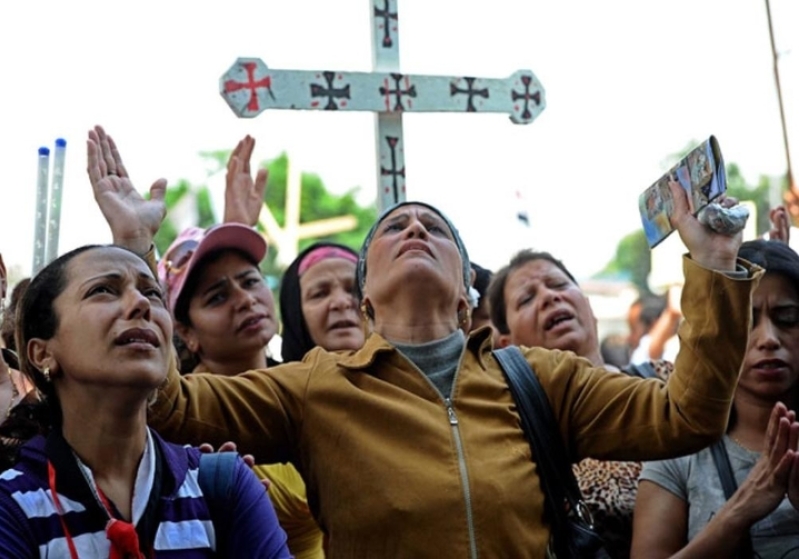
The eighth Coptic Christian shot and killed this year by Islamic extremists has been remembered as a "humble and peaceful" man who had a deep relationship with God.
World Watch Monitor reports that on May 6, Nabil Saber Ayoub Mansour, a married father of two young children, became the eighth Egyptian Coptic Christian to be murdered this year in the region in what appear to be linked killings.
The 40-year-old church deacon and his family had fled to Port Said from El-Arish earlier this year due to continued attacks on Coptic Christians. At the time of his death, Mansour had briefly returned home to retrieve paperwork from his 12-year-old son's school.
When he arrived in El-Arish, Mansour went to his former home, planning to visit the school the next day. Mansour collected his son's certificate on Saturday and then went home to rest, planning to return to Port Said early the next day.
However, he never arrived.
Mansour's neighbors witnessed the attack, later telling Mansour's brother-in-law, Moheb Qadry Fares, what happened.
Fares told WWM that four masked, armed men shot him with four bullets: two in the head, one in the stomach, and one in the shoulder, instantly killing him. While they were shooting him, they were asking: "Why do you return back again, oh Kafir?" After shooting him, they took his ID card and his cell phone and fled.
"There is a police checkpoint near Nabil's home," said Fares. "How did the police allow those masked gunmen to enter the area and kill Nabil in the daytime? Where was the security when this incident took place? None of them did anything."
He added that police were also guarding the Church of Saint Mary and Saint Michael (also known as 'the cathedral of Arish') behind Nabil's home.
"How [did] those masked men manage to enter the area and carry out their crime without getting arrested, even though the sound of the shooting was heard by all the residents of the area?"
At Mansour's funeral earlier this week, Fr. Moisses Noam, a priest at Saint Mary and Saint Michael, remembered him as a "good deacon and one of the church's honest sons."
"He was very meek, quiet, humble, peaceful, and he had a strong relationship with God. He was loved by all," said Noam.
He added, "Murdering Nabil at this time is a clear message from those militants that they don't want any Copts in El-Arish, and a clear threatening message to all the Copts who fled El-Arish that ...if anyone of you return to El-Arish, his fate would be like the fate of Nabil".
Since the death of Mansour, Fr. Noam said, some of the Christian families who chose not to flee El-Arish in February have now decided to leave the city.
Mansour's murder is the latest in a slew of killings carried out by a local affiliate of Islamic State, known as Sinai Province. So far this year, seven other Coptic Christians have been murdered at the hands of the jihadist group. After the killing of two of the victims, the murderer was seen ticking their names off a hit list.
As reported by The Gospel Herald, ISIS earlier this year vowed to step up its attacks against Egypt's Christian minority, who account for about 10 percent of the 92 million population. Copts are the indigenous Christian population of Egypt, who date back to the first decades following the life of Jesus Christ.
Last week, an ISIS leader warned Muslims to stay away from Christian gatherings in Egypt, as the group is planning to carry out more massacres in the coming months.
"We are warning you to stay away from Christian gatherings, as well as the gatherings of the army and the police, and the areas that have political government facilities", the leader, who was not named, said in an interview in the ISIS Al Naba weekly newspaper, according to the MailOnline.
On Palm Sunday, 49 were people killed in twin attacks on churches in Egypt. ISIS took responsibility for the bombings, which have since been recognized as the deadliest attack against Egypt's Coptic Christians in years.
Three days later, extremists slit the throat of a 16-year-old Coptic Christian boy in an attempt to further intimidate believers ahead of Easter, as reported by GH. The group also claimed responsibility for the December bombing of a church adjacent to St. Mark's Cathedral in Cairo, one of the most symbolic religious sites for Egyptian Copts. That explosion killed 30 worshippers and injured dozens.






